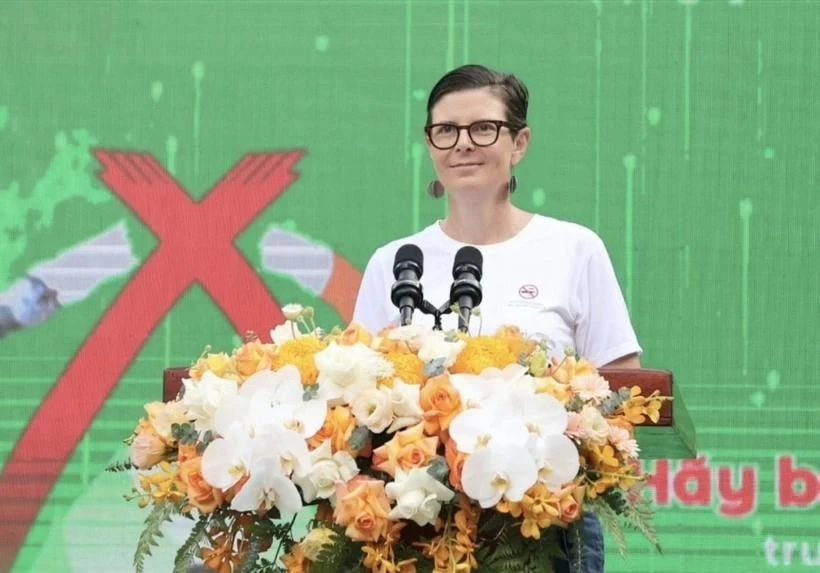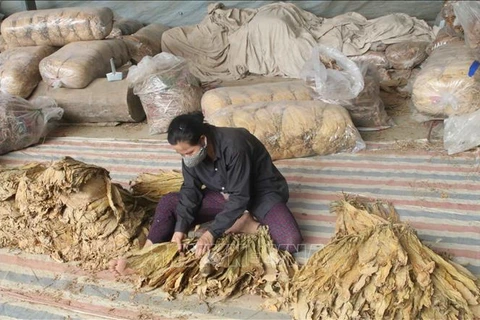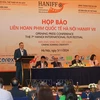
Hanoi (VNA) – Vietnam has made some progress in combating the harmful effects of tobacco over the past decade, Angela Pratt, WHO Representative in Vietnam, has assessed.
Pratt delivered the assessment at a workshop on the harmful effects of tobacco and the role of tax policy in controlling the product. The event was co-organised by the Ministry of Information and Communications and HealthBridge Canada in Vietnam in Hanoi on August 13.
Stronger action needed
Pratt emphasised that tobacco use leads to tens of thousands of deaths in Vietnam each year and these deaths are preventable. Recent data from the General Statistics Office indicated that the consumption of tobacco in the Southeast Asian nation is on the rise again, with total production increasing by more than 10% from 2022 to 2023. In light of this, she urged stronger action from authorities to reduce tobacco use and protect public health.
One of the key challenges, she noted, is the low price of tobacco in Vietnam, making it increasingly affordable as incomes rise. To address this, Pratt suggested that increasing tobacco taxes is the quickest and most effective way to reduce consumption.

According to the 2025 law and ordinance building programme, the draft law on special consumption tax (revised) will be presented to the National Assembly for consideration at its 8th session in October 2024 and is expected to be passed at its 9th session in May 2025. The draft proposes maintaining the current 75% tax rate while introducing an additional specific tax, increasing annually from 2026 to 2030, with two options for implementation.
Option 1 proposes a tax increase of 2,000 VND (0.081 USD) per pack in the first year, reaching 10,000 VND in 2030. Option 2 suggests an immediate increase of 5,000 VND per pack in 2026, with an annual increase of 1,000 VND over the next five years, reaching 10,000 VND per pack by 2030.
Experts have assessed that the proposed special consumption tax in the draft law is still low and may not sufficiently curb tobacco use or protect public health as expected.
Pratt acknowledged that the proposed law is a step in the right direction. With the amendment to the special consumption tax law, WHO believes that Vietnam has a unique opportunity to achieve higher health goals and greater benefits for its citizens.
Tax targeted to account for 70-75% of retail price
Experts agree that institutionalising a special consumption tax policy on tobacco is the most effective approach, serving as a key measure to control its consumption in Vietnam. It also helps increase state budget revenue and advances progress toward sustainable development goals.
Dinh Thi Thu Thuy, Deputy Director of the Department of Legal Affairs under the Ministry of Health, stated that a steady tax increase is necessary to keep tobacco prices aligned with income growth. The ultimate goal is to achieve an optimal tax level that accounts for 70-75% of the retail price, as recommended by WHO.

The Ministry of Health has proposed that the specific tax should reach 15,000 VND per pack (20 cigarettes per pack) by 2030, alongside the 75% proportional tax. This approach is expected to achieve a 65% tax share of the retail price, nearing WHO's recommendation of 70-75%, and reduce the smoking rate among men to 36% by 2030.
Economic expert Dao The Son pointed out that industrial production and consumption indicators show that tobacco business has continued to grow over the past decade. Although production and consumption growth slowed slightly during tax increases in 2016 and 2019, the impact was minimal. Therefore, a significant tax increase is needed to slow down consumption growth and reduce use.
Additionally, to decrease affordability, substantial tax increases on tobacco should be implemented regularly to keep pace with inflation and income growth, he recommended./.






















